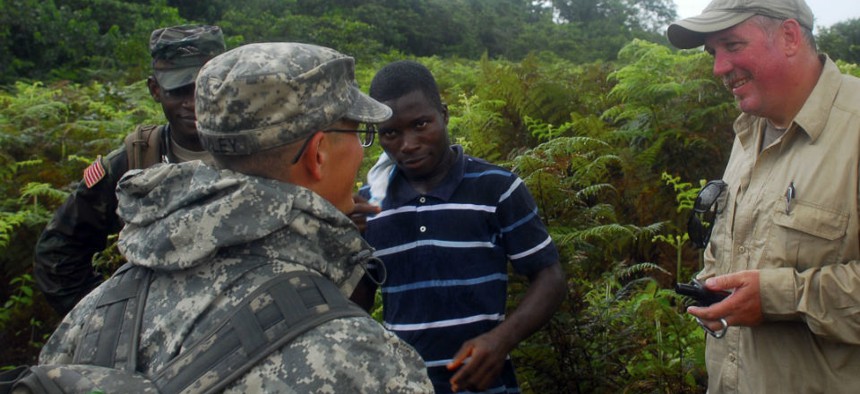
U.S. military personnel discuss construction details with a Liberian contractor at the future location of an Ebola treatment unit in Liberia. Pfc. Craig Philbrick/U.S. Army
U.S. Troops Fighting Ebola in West Africa Are Earning Bonus Pay
Military members can earn up to $400 extra per month.
The U.S. military has committed 3,900 troops to fight and contain the outbreak of Ebola in West Africa, and for their efforts they will be earning a little extra money.
Uniformed service members deployed in Liberia, Senegal and Sierra Leone as part of Operation United Assistance will receive up to $400 per month in bonus pay during their deployment. All military members on the mission will earn an extra $150 per month for hardship duty, while members with dependents will earn an additional $250 for separation allowance.
Both pay adjustments are retroactive to the day of arrival after serving for 30 days, according to Pentagon spokesman Lt. Cmdr. Nate Christensen.
There are currently more than 500 troops in the three countries, but that number is expected to rise significantly.
The Defense Department said on Thursday “the risk is relatively low” for troops deployed in Operation United Assistance to contract Ebola, and soldiers are practicing “basic sanitation and cleanliness” as a precaution.
“I'm not an epidemiologist,” said Maj. Gen. Darryl Williams, who is in charge of the U.S. Joint Operations Center in Liberia, “but it's been shown that this disease is most manifest when handling bodily fluids -- blood, other sorts of fluids, and there is no plan right now for U.S. soldiers, sailors, airmen and Marines to do that.”
Several hundred federal civilian personnel are also deployed in West Africa as part of the U.S. government’s response to the outbreak. The Office of Personnel Management said additional pay for those workers is determined by the State Department and their individual agencies.
Federal statute allows for hazard pay, though it typically is awarded when employees are in physical hardship, such as construction on a tall building. Civilians can also earn environmental differential pay, amorphously defined as employees who are “exposed to a working condition, physical hardship, or hazard of an unusually severe nature.”







